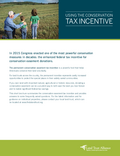
Tax Incentives
Conserving one’s land is a major financial decision, and one that may significantly reduce the value of your biggest asset: your land. Fortunately, some conservation easements qualify for certain federal tax incentives.
Benefits
A conservation easement donated to a land trust or sold below appraised value (“bargain sale”) may entitle the donor to claim a charitable tax deduction for the easement’s value on his or her federal income tax return. The easement must protect land with important natural, agricultural, scenic, or historic resources as outlined in the federal tax code.
Valuation
The value of a conservation easement varies widely from one property to another. There is no fixed calculation, and the Monadnock Conservancy cannot provide estimates. Only a licensed real estate appraiser who meets certain federal qualifications may determine the value of a conservation easement. Please talk to your lawyer and/or tax advisor for advice specific to your situation.
In some cases of especially valuable property, a conservation easement may reduce a property’s value to below the threshold of federal estate tax, thereby sparing heirs significant costs of inheritance.
Want to know more about tax benefits?

Using the Conservation Tax Incentive
File size: 383 KB
File Extension: .pdf
In 2015 Congress enacted one of the most powerful conservation measures in decades: the enhanced federal tax incentive for conservation easement donations. Learn more in this informational brochure from the Land Trust Alliance.
Why I Conserved
It’s nice knowing that we’re able to keep the land in the family and people are able to make their living off the land.
— Henry Brooks, Sullivan, N.H.